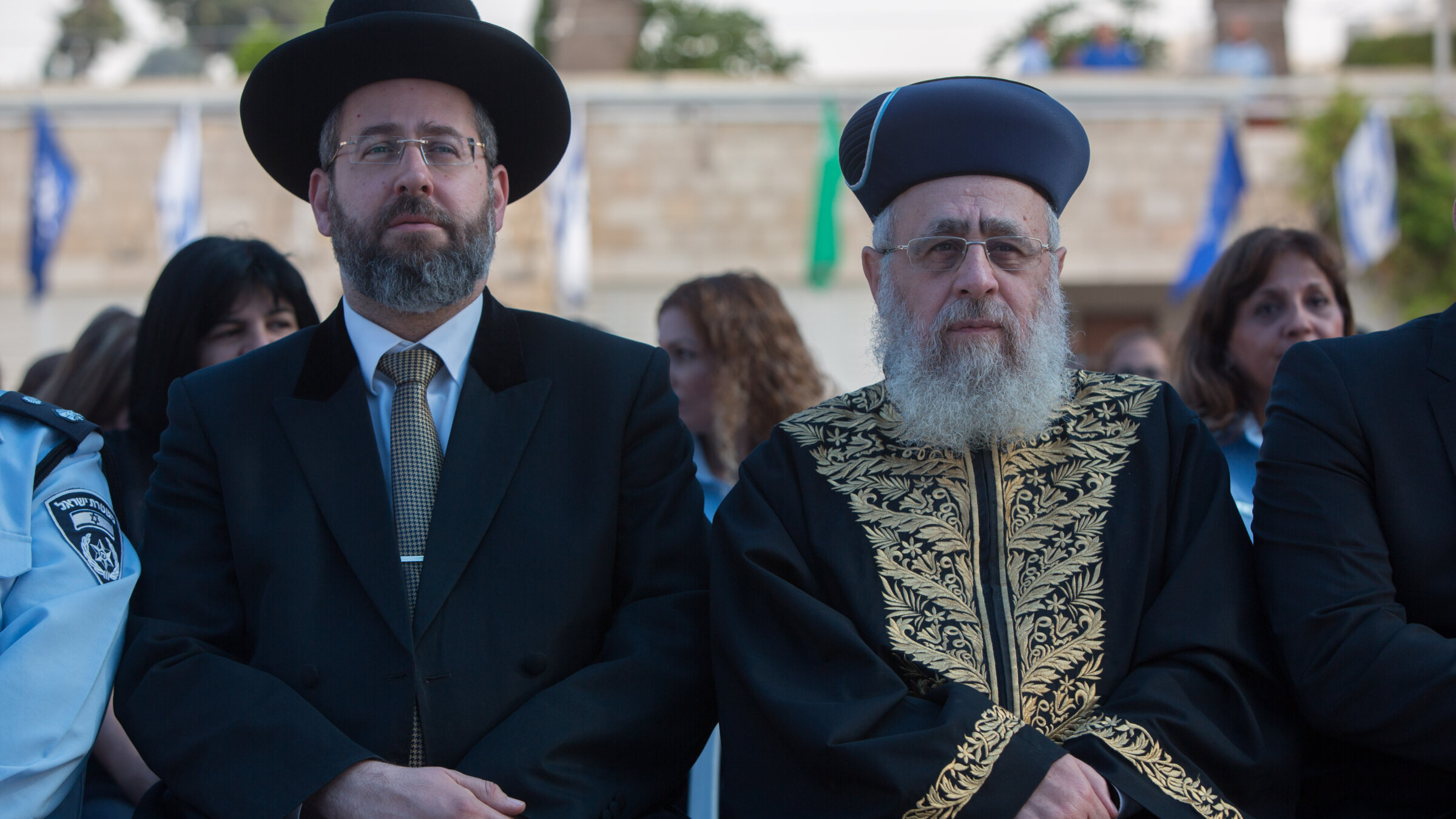Israel without a chief rabbi for first time in a century
The government has failed to set a date for their successors’ election

Sephardi Chief Rabbi Yitzhak Yosef, right, and Ashkenazi Chief Rabbi David Lau attending a New Year’s ceremony at the national headquarters of the Israel Police in Jerusalem, Sept. 7, 2015. (Yonatan Sindel/Flash90)
(JTA) — Israel’s two chief rabbis stepped down from their posts this week, leaving the positions officially vacant for the first time in more than a century as the government has failed to set a date for their successors’ election.
Two rabbis have stepped in to fulfill the jobs’ duties on an interim basis, but who the next Ashkenazi and Sephardi chief rabbis will be — and when they will be chosen — remains unclear. The two outgoing rabbis, Ashkenazi David Lau and Sephardi Yitzhak Yosef, were elected in 2013 to a 10-year term by a body of approximately 150 people.
The chief rabbis sit atop the vast bureaucracy of the haredi Orthodox-controlled Israeli Chief Rabbinate, which manages broad swaths of religious life in Israel including marriage, burial and conversion. The chief rabbis hold little power on their own over the day-to-day operations of the Chief Rabbinate, which is run by a council, but they traditionally command significant influence in Israeli public religious discourse.
“At this hour the term of the chief rabbis is ending,” Michael Malkieli, Israel’s religious affairs minister, posted on X on Monday. “It was a term full of complex challenges, during which they led the citizens of Israel with bravery and courage.”
What Malkieli’s post did not include was a date for a new election. A scheduling conflict and concerns regarding the makeup of the voting body mean that his ministry has repeatedly postponed a vote that was supposed to take place last year.
First, the rabbinate election clashed with Israel’s local elections. But the date was then pushed off again because of two rulings from Israel’s Supreme Court: Both Lau and Yosef come from rabbinic dynasties and the court ruled that, because both have brothers running for their posts, the chief rabbis couldn’t have a hand in choosing members of the body that votes for their successors. The second ruling instructed them to “consider” appointing more women to the voting body.
Now, multiple petitions to the Supreme Court are demanding that the court order the government to immediately schedule elections, which by law were supposed to have happened already. One petitioner is Itim, an organization that helps Israelis navigate the rabbinate’s bureaucracy and advocates for better governance in the body.
“At present the Chief Rabbinate has power and needs to be transparent,” Rabbi Seth Farber, Itim’s founder, told the Jewish Telegraphic Agency. “Right now they are violating the law by not having elections.”
Using a Yiddishism meaning “craziness,” he added, “We want to stop this mishagaas once and for all. If the new rabbinate is not willing to work with us, we will work hard to limit their powers.”
There have been attempts at changing the Chief Rabbinate via elections in the past. In the last election in 2013, a reformist candidate, religious Zionist Rabbi David Stav, ran a high-profile campaign but fell short. This year, relatives of David and Yosef, both of whose fathers also served as chief rabbis, hope to keep the positions in the families.
Criticism of the Chief Rabbinate is widespread among Israeli Jews — spanning secular Jews who chafe at its religious restrictions and haredi Jews who want it to be more stringent or who blanch at its affiliation with the Israeli government.
According to a survey conducted in May by the Israel Democracy Institute, just 44% of Israeli Jews say they “accept the Chief Rabbinate of Israel as a religious or spiritual authority.” That includes 66% of haredi respondents and just 17% of secular Jews. The rabbinate’s highest rating, 78%, came from religious Zionists.
A message from our Publisher & CEO Rachel Fishman Feddersen

I hope you appreciated this article. Before you go, I’d like to ask you to please support the Forward’s award-winning, nonprofit journalism so that we can be prepared for whatever news 2025 brings.
At a time when other newsrooms are closing or cutting back, the Forward has removed its paywall and invested additional resources to report on the ground from Israel and around the U.S. on the impact of the war, rising antisemitism and polarized discourse.
Readers like you make it all possible. Support our work by becoming a Forward Member and connect with our journalism and your community.
— Rachel Fishman Feddersen, Publisher and CEO

























